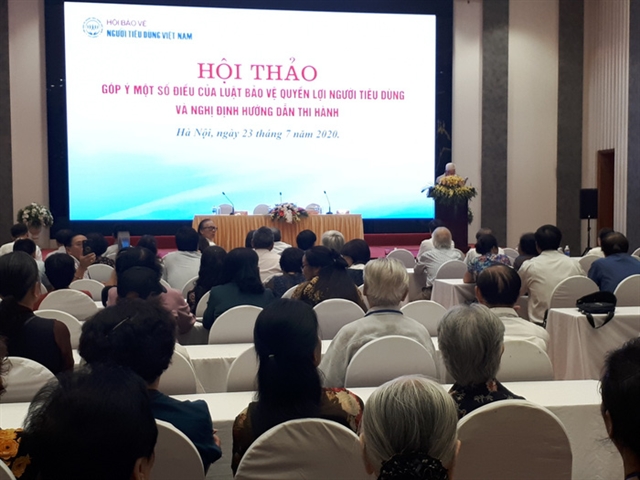While more and more Vietnamese people are turning to e-commerce, the current consumer protection law does not properly cover online shoppers.

While more and more Vietnamese people are turning to e-commerce, the current consumer protection law does not properly cover online shoppers.
Attending a workshop discussing the laws held by Viet Nam Consumer Protection Association in Ha Noi last week, experts said more effective solutions are needed to protect consumers.
Nguyen Manh Hung, the association chairman, said: “Ten years after the law went into effect, it has gradually helped protect the shopping and consumption activities for more than 90 million Vietnamese people.”
“However, the law has revealed many limitations and not yet met the demand of local consumers. The basic rights of consumers are still seriously infringed in Viet Nam, especially in online trading which is booming now.”
According to the e-Commerce White Book 2019, about 39.9 million people shopped online in 2018, up by 6.3 million people against the previous year. Average spending for online shopping was $202 per person in 2018, $16 higher than in 2017.
Issued ten years ago, some provisions of the law were still unclear or no longer relevant to the context of the current e-commerce and online business models.
In Viet Nam, except common e-commerce sites like Lazada or Shopee, many consumers bought products from individual sellers via social networks such as Facebook and Zalo, where there are no rights for buyers or obligations or sellers.
At the same time, the association said: “Many consumers still don’t know about the law and never ask for help when their interests are harmed.”
Through different surveys, the association said only around 15 per cent of consumers know about the Law on Consumer Protection, the rest do not know their rights and obligations when shopping online.
As a result, while many consumers faced issues when shopping online, there were few complaints made.
Phan Thi Viet Thu, head of HCM City’s Consumer Protection Association, said while the law on commerce regulated obligations of enterprises when they offer promotions to consumers, the law on consumer protection did not.
Thu said: “When trading online, many customers were offered gifts or bonuses when purchasing products, but after payment, they did not receive any.”
Even when the consumers ask for help, a consumer protection official from Da Nang City said: “It is also difficult to help consumers who bought their products via Facebook or Zalo as there is no invoice or trading agreement. We have no proof of the transaction.”
At the seminar, participants agreed that the law should be changed with clearer regulations for online trading.
Chairman of the association told Viet Nam News: “Consumers are the ones who help grow local production and contribute to the national economy, so all their rights should be protected.”— VNS
|
Recently, Viet Nam has set a target to grow the local e-commerce industry by 25 per cent per year to reach US$35 billion with more than half of the population shopping online by the end of 2025. The e-Commerce White Book 2019 revealed that e-commerce revenue jumped 30 per cent from $6.2 billion in 2017 to $8.06 billion in 2018, while the size of the local e-commerce market was expected to reach $13 billion in 2020. The e-Conomy SEA 2019 report by Google and Temasek predicted that e-commerce in Viet Nam would expand 43 per cent per year in the 2015-25 period, making Viet Nam the fastest growing e-commerce market in the region. — VNS |





